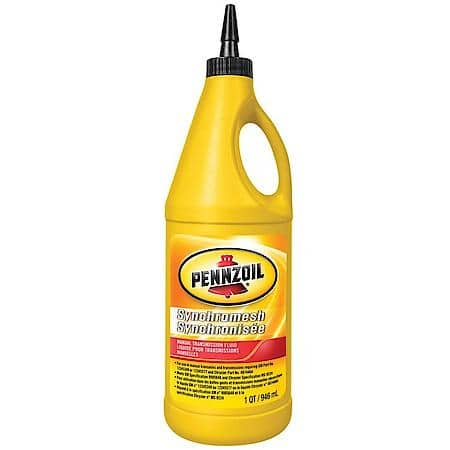Choose a Store
- Shop All
- Replacement Parts
- Performance Parts
- Accessories
- Oil & Fluids
- Special Offers
- Speed Perks
- Advice & How-Tos
- Project Guides
Share


Loading...
How Would You Like To Get This Item?
Store Pickup
Same Day Home Delivery
Home Delivery
Product Information
Product Details
Part No. 3501
Warranty Details (30 DAY REPLACEMENT IF DEFECTIVE)
Designed for certain manual transaxles and manual transmissions used by General Motors or Chrysler, Pennzoil Synchromesh fluid provides excellent oxidation stability and low-temperature performance. It's formulated with high-quality paraffinic base stocks, a fluidity modifier, multifunctional performance additives, corrosion inhibitors, a foam suppressor, and a shear stable viscosity index improver additive. Pennzoil Synchromesh also offers excellent synchronizer performance and compatibility with yellow metals (such as bronze, brass, and copper components found in manual transaxles and transmissions). This product will satisfactorily lubricate General Motors or Chrysler manual transaxles and transmissions from -40 degrees C to +150 degrees C.
Product Features:
Product Features:
- Transmission fluid designed for certain manual transaxles and manual transmissions used by General Motors or Chrysler
- Excellent low-temperature performance and oxidation stability
- Excellent synchronizer performance
- Excellent compatibility with yellow metals such as bronze, brass, and copper components found in manual transaxles and transmissions
- Formulated with high-quality paraffinic base stocks, a fluidity modifier, and multifunctional performance additives
- Meets GM Specification 998564; suitable for use in GM manual transaxles and transmissions requiring GM Part No. 12345349 or 12345577
- Meets Chrysler specification MS-9224; suitable for use in Chrysler transaxles and transmissions requiring Part No. 0487446
- For a full list of equipment approvals and recommendations, please consult your local Shell Technical Help Desk and always consult your owner's manual
Specifications
ATV:
No
Container Size:
1 qt
Container Type:
Bottle
Conventional:
Yes
Detergent or Non-Detergent:
Detergent
Diesel Approved:
No
High Mileage Formulation:
No
Oil Composition:
Conventional
Race Only:
No
Synthetic:
No
Synthetic Blend:
No
Viscosity Index:
ASTM D-2270
No results
Feedback
Be The First To Know About Deals And Promotions.
Plus, create an account to receive $5 off of $20 or more.
TOP REPLACEMENT PARTS
ROUTINE MAINTENANCE PARTS
CUSTOMER SUPPORT
ABOUT US
PROFESSIONAL SHOPS